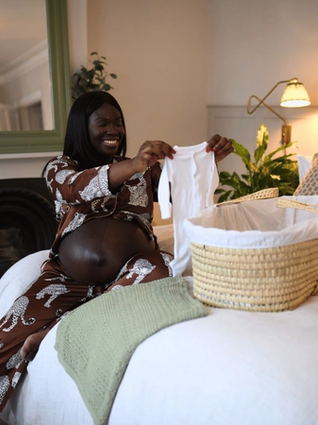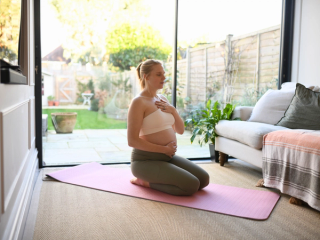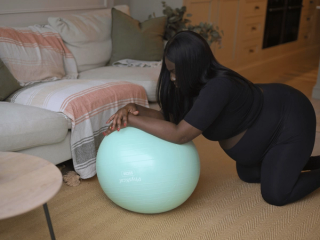
- Home
- Advice Hub
- Pregnancy
- Labour & Birth
- Preparing For Birth
Preparing mentally and physically for birth
Discover essential tips for mentally and physically preparing for birth. From crafting a birth plan to engaging in prenatal classes, learn how to approach labour with confidence.
Reviewed by Christine Lane, Midwife and Consultant, on the 24.09.2025
Navigating through pregnancy, labour and birth can be a happy and exciting time, but it can also bring about feelings of apprehension and worry, particularly if you are expecting your first baby. Feelings of apprehension are totally normal as you have a lot to think about and prepare for. Aside from the various appointments you have to remember and things you’ll need to buy for the baby, you’ll also be faced with a number of physical changes, trying to learn about what to expect, and preparing yourself for the birth of your baby.
To help you feel calm, ready, and able to navigate this exciting time with ease, here are our top tips for preparing for your labour and birth, both mentally and physically.
The more of the following tips you can follow, the more prepared you and your body will feel.
Labour and birth preparation
There are two aspects to preparing for the birth; physically and mentally. These involve a mixture of education, practical preparation, i.e. making sure you have items ready for the baby, and for yourself that you’ll need, making sure your body is healthy for birth, gathering your support network of family and friends for the postnatal period, and familiarising yourself with relaxation techniques. Keep reading for a detailed breakdown of everything you need to learn how to prepare for birth.
Attend educational classes
The NHS and HSE both provide free antenatal classes for expectant parents.
Speak to your midwife or GP for information on how to find a free class that’s local to you.
There is also an abundance of private providers offering really great classes to help you get ready.
Face-to-face classes are a great way to meet other expectant parents living in your area whilst, online formats allow much more flexibility. Whichever class you choose, make sure the approach is one that works for you and ensures you are fully informed about every eventuality. Most classes run over several sessions to ensure you get all the information you need to prepare you for the big day.
Antenatal classes are usually geared towards labour and birth preparation, helping you to understand the different scenarios you may encounter during your labour and delivery. By the end of these classes, you should have a really good understanding of how labour progresses, pain relief options, birth place choices, water birth, instrumental delivery and caesarean section.
Be sure to choose a class that also covers looking after a newborn baby and managing those early days after birth. Having this knowledge will help you decide what kind of birth you would prefer, and enable you and your partner to make informed decisions as and when the need arises.
Tips on preparing for birth physically
The first trimester may leave you feeling a little bit lacklustre but, as you move past the 12-week mark, your energy levels should increase, making keeping fit that little bit more inviting.
If you start to feel fatigue or aches and pains, listen to your body. imagine this is your baby sending you a text saying, “Hey, slow down Mamma!”.
Staying fit and healthy throughout your pregnancy will put you in a better position to give birth. It would be really easy to sit back and eat for two, but it’s best to stick to a healthy balanced diet with only a very small increase in calories in your final trimester.
Exercise
For those ladies that already exercise regularly, it’s fine to continue with your normal routine – albeit with some adjustments if you enjoy weightlifting or contact sports. Thirty minutes of exercise everyday really will empower you to feel strong and ready for labour and birth.
If you are not used to exercising, there is no reason why you can’t take up some light movement during pregnancy.
Pregnancy yoga and pilates
Pregnancy yoga and pilates are a great choice as they both help to strengthen the body and mind. This gentle exercise can help improve sleep, decrease back and pelvic pain and reduce stress and anxiety. At such a busy time in your life, taking time out to stretch and relax is a wonderful way to prepare your body and spirit and help you to continue to connect and bond with your baby. If you’re unable to try yoga or pilates, simply going for regular walks.
Swimming classes
Aquanatal classes are specially designed for pregnant women to undertake in the final two trimesters. Movement in the water can help to gently stretch and strengthen muscles. As well as being a really great way to meet other expectant mums, aquanatal helps to boost circulation and improve your overall fitness without putting strain on joints or ligaments that may already be aching.
Keep yourself hydrated when exercising. You should be drinking around 2.5 litres of water a day which is around 8 glasses. Having a sports bottle handy to sip on throughout the day is a great way to get extra water into you.
Perineal massage
One of the ways in which you can physically prepare your body for birth is perineal massage – i.e. massaging the skin and muscle between your vagina and anus. This is the skin that is most likely to tear during delivery, so massage – using lubricant and your or your partner’s fingers – prepares it to stretch. Daily perineal massage has been shown to have the most benefit in preventing or reducing the severity of perineal trauma.
Tips on preparing for birth mentally
Preparing mentally for giving birth is just as important as physical preparation.
Hypnobirthing
Hypnobirthing is a powerful way to mentally prepare for labour and birth. Hypnobirthing courses teach techniques that help you understand how the mind and body work together during childbirth, using visualisations, affirmations, guided meditations, and light touch. While it’s especially effective with involvement from a birth partner, it can also be practised alone.
Your hypnobirthing teacher will explore with you various breathing and relaxation techniques that you and your partner can use before, during and after your contractions to help you release any tension that is gathering in your body.
Using guided imagery, you will learn how to transport yourself to your favourite places in nature and in doing so relax into your body’s efforts to bring your baby into your arms. Hypnobirthing courses should have a focus on positive birthing experiences rather than just focusing on unassisted birth. Hypnobirthing aims to empower women to have trust in themselves, build confidence and promoting the feeling of calm and control. They also include self advocacy and being able to voice any concerns you may have during labour and birth.
Tune out the negativity
If you’ve given birth before, you’ll know the urge to discuss your experiences of birth, good and bad, is how we process it. However, listening to other people’s birth stories, especially if the experience wasn’t a positive one, can stir up some unwanted anxiety as you wait to meet your baby.
Try to avoid watching fictional programmes focused on childbirth, as they often portray extreme scenarios and aren’t always helpful or relaxing. Instead, choose something light-hearted or uplifting to help you unwind and take your mind off any worries. Wherever possible, include your birth partner in these moments too – it’s a great way to stay connected and prepare together.
Our birth partners have a daunting task ahead of them. Unless your supporter has experience of attending the birth of a baby, you can bet that they will be a little anxious about the big day too. When you choose your antenatal classes or hypnobirthing courses, make sure that partners are welcome to attend with you. It will make a huge difference if you have a confident person by your side, guiding you through each contraction.
Finally, have faith and relax
Although we all feel a little apprehensive as our due date approaches, keep in mind that discomfort is a normal, healthy part of bringing a new and wonderful person into the world.
Countless women have been through this before you, and many more will follow in your footsteps. You’re in safe hands with your partner, midwife, and doctors – so try to relax into the experience. Before you know it, your new baby will be snuggled in your arms.
HiPP mum Nicola agrees, adding: ‘Your partner will be an amazing support and the process will bring you together. Midwives are amazing and know what they’re doing. Trust them, remember that women have been doing this for a very long time. And yes, it will hurt. But also, you can say yes to pain relief. How the baby comes out doesn’t reflect on how good a parent you are. Oh, and definitely take the paracetamol after birth. You will need it.’
Write a birth plan
Many people believe that a birth plan is a piece of paper handed to your midwife outlining your thoughts on pain relief and the presence of students. But a good birth plan is so much more than that. It's a good idea to have your birth plan prepared by the time you reach the 37th week of your pregnancy.
You may want to include things like your choices for environment, i.e. soft lights, music, choice or who your birth partner will be. Include whether you have practised hypnobirthing and your thoughts and feelings surrounding pain relief options and interventions. You may also want to have an appendix to your birth plan detailing your wishes if the birth becomes a little more complex and interventions are suggested. It doesn’t need to be long, around one A4 piece of paper should be enough. Include all the things that you feel are most important to you and discuss it with your midwife during one of your antenatal appointments if you can.
If you are preparing for a caesarean birth, you can still write a birth plan. You can include things like having skin to skin with the baby, whether you’d like music played during the birth and discuss the possibility or having the screen lowered if that’s something you would like.
HiPP mum Gen suggests you don’t call it a birth plan, but instead think of it as birth preferences. ‘No birth ever goes to plan, but it is important to have a record of what is important to you and to share it with your birth team. I did hypnobirthing and it really helped me feel in control of my birth. I ended up having an epidural and an episiotomy but I felt in control the whole time.’
Emma agrees: ‘Make a plan, but know that you might not get to choose on the day. Try to relax and be ok with going where the situation takes you.’
Birth plans are not essential but they are useful to both you and your birth team. Include your birth partner in the writing process so that they are familiar with what your wants and wishes are.
If you have had a baby before and you have experienced any kind of birth trauma, know that there is someone that you can talk to. Most hospitals will offer a debriefing service where you can speak with a midwife about the circumstances around your previous birth. Trauma informed care is essential for subsequent pregnancies so be sure to let your care team know about any previous trauma or concerns that you may have.






